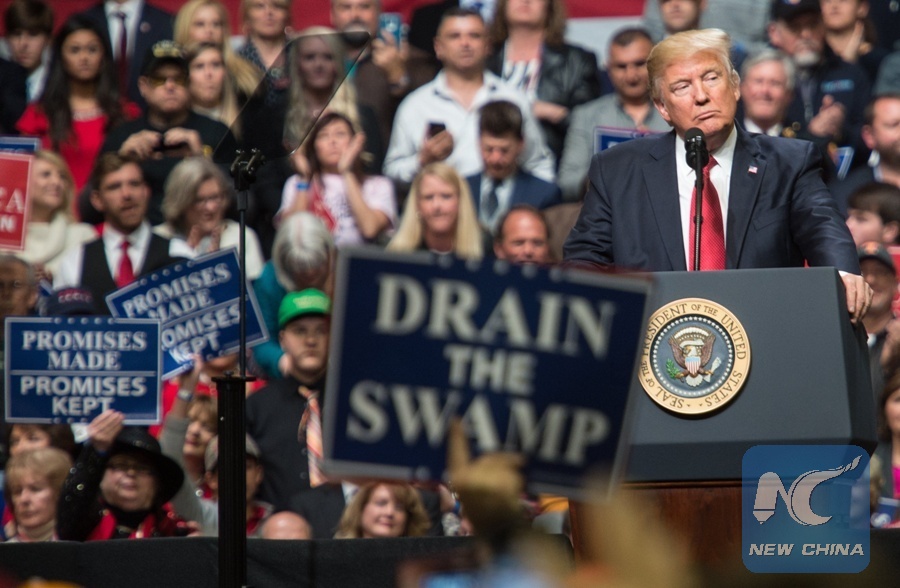
U.S. President Donald Trump speaks during a rally in Nashville, Tennessee on March 15, 2017, during which Trump vows to challenge travel ban block at the Supreme Court if needed. (Xinhua/AFP PHOTO)
By Matthew Rusling
WASHINGTON, March 17 (Xinhua) -- U.S. President Donald Trump is at odds with the nation's courts over a recent immigration order, and he may fight all the way to the U.S. Supreme Court, experts said.
At issue is an executive order Trump issued in January, when he temporarily banned a small group of citizens from Muslim-majority nations from entering the United States, on fears that terrorists could sneak in among them. The so-called visa ban grabbed headlines worldwide, amid images of protesters at airports.
Since then, Trump has amended the ban, but a federal judge in Hawaii on Wednesday stopped it, sparking a fight with the White House that may end up at the Supreme Court.
White House spokesman Sean Spicer said Thursday that the administration plans to appeal the federal judge's ruling, explaining that the danger from terrorism is real.
There are two sides to the issue. The U.S. Constitution forbids discrimination based on religion, and the courts have ruled that the ban, which bars entry of citizens from six Muslim-dominant countries for 90 days, amounts to blanket discrimination against Muslims and is thus unconstitutional.
Supporters of the ban contend it is not a ban on the Muslim religion, noting that it only covers Iran, Libya, Somalia, Sudan, Syria, and Yemen.
The ban does not cover dozens of majority Muslim nations across the world, such as Indonesia, for example, the world's largest Muslim nation by population.
Supporters of the ban also point to a 1952 U.S. law that says the president has the right to bar any class of aliens into the United States if he thinks their entry would be detrimental to the interests of the country.

Demonstrators gather near the White House to protest President Donald Trump's travel ban on March 11, 2017 in Washington, DC. (Xinhua/AFP PHOTO)
Former President Harry Truman blasted the 1952 law, vetoing it more than 60 years ago and calling it a "slap at millions of Americans whose fathers were of alien birth." But Congress supported the law and was able to override it.
Supporters of the travel ban also argue that the federal judges who blocked Trump's ban are making decisions based on politics and not on law.
Experts said the fight between the White House and the courts is likely to continue until the case is heard by the nation's highest court.
"Trump is likely to continue the court fight over his travel ban and take it all the way to the Supreme Court," Darrell West, vice president and director for governance studies of the Brookings Institution, told Xinhua.
"He has been defeated by federal judges, but hopes if the Senate confirms his court nomination, the Supreme Court will decide in his favor. They may overturn lower court decisions in favor of a ruling that supports the ability of presidents to make border entry decisions," West said.
Judges see Trump's travel ban as discriminating based on religious beliefs and being arbitrary because most of the terrorists have come from countries not included in the ban. For them, the policy is a clear case of executive overreaching and a violation of constitutional principles, he said.
Karlyn Bowman, a senior fellow at the American Enterprise Institute, told Xinhua that she does not know whether the arguments the judges have made about constitutionality of the visa ban will pass muster in the Supreme Court.
While the initial law caused a media frenzy in January, that has died down quite a bit. Now, there are questions over whether the ban has hurt Trump's public image.
"Public opinion is not as engaged as it was when the initial order came down. I don't think (Trump) is hurt by the new order with the public -- views hardened very early on this one -- but he probably isn't helped," Bowman said.

A protester holds a sign near the White House to protest President Donald Trump's travel ban on six Muslim countries on March 11, 2017 in Washington, DC. (Xinhua/ AFP PHOTO)
The executive order also calls for a 120 day suspension on refugees entering the United States.
"Historically, Americans have been skeptical about accepting refugees," Bowman said. "So in that sense, (Trump) isn't hurt. The news cycle is moving so fast now. I doubt he is helped by it. The damage was done earlier."
West said Trump already has lost the public opinion battle on his travel ban, as many Americans feel that it is misguided and wrong-headed.

